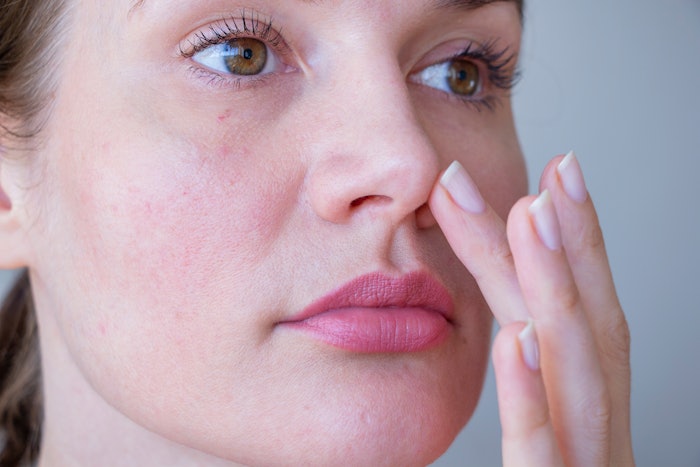
The National Rosacea Society (NRS) designates April as Rosacea Awareness Month to educate the public on this chronic facial skin disorder estimated to affect more than 16 million Americans and to urge those who suspect they may have it to see a dermatologist for diagnosis, treatment and guidance on gentle skin care.
Related: AARS Introduces #RosaceaRescues During Rosacea Awareness Month
The most common individual sign of rosacea is persistent redness on the central part of the face — the cheeks, nose, forehead and chin. The redness may be accompanied by itching, burning or stinging and sufferers may also experience bumps and pimples or develop tiny visible blood vessels on their skin. Many rosacea sufferers turn to skin care products and cosmetics to treat or cover up these signs and symptoms, mistaking them for sunburn or acne.
In an NRS survey of 1,104 rosacea patients, 82% reported that certain skin-care products and cosmetics aggravated their condition and 70% said there were specific ingredients that irritated their skin. The most common irritants were astringent alcohol (63%), perfumes or fragrances (57%), witch hazel (31%) and menthol (30%). Around a quarter of respondents were affected by peppermint or eucalyptus oil, dyes and pigments, sulfates, and parabens or other preservatives. Photo courtesy of National Rosacea Society
Photo courtesy of National Rosacea Society
The National Rosacea Society Expert Committee published updated management options for rosacea in 2019, including the use of gentle cleansers and nonocclusive moisturizers that do not irritate their skin. Patients are also advised to always use sunscreens, preferably mineral-based products that contain zinc oxide or titanium dioxide for physical protection rather than potentially irritating chemical protection. The NRS also recently launched a new Seal of Acceptance program to identify skin care and cosmetic products that may be suitable for patients with rosacea.
“Skin care and cosmetics are an often underappreciated but important element in rosacea therapy,” said Hilary Baldwin, M.D., associate professor of dermatology at Rutgers Robert Wood Johnson Medical School and a member of the NRS medical advisory board. “The use of gentle cleansers, moisturizers that help repair the skin moisture barrier, and sunscreens that protect against rosacea flare-ups can work to support and even augment medical therapy for the disease.”
The best results are achieved when patients and their doctors work together to identify appropriate therapies and monitor their progress, Dr. Baldwin added.
“The use of skin care products and cosmetics can help minimize the appearance and effects of rosacea, but poorly selected products may make it worse,” Dr. Baldwin said. “Fortunately, there are many products today that are formulated to be suitable to sensitive, rosacea-prone skin, without ingredients that may cause flare-ups. These may be used in combination with prescription therapies and procedures that more directly address the signs and symptoms of the disease.”










